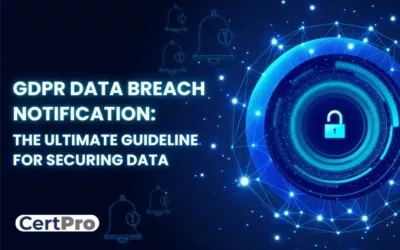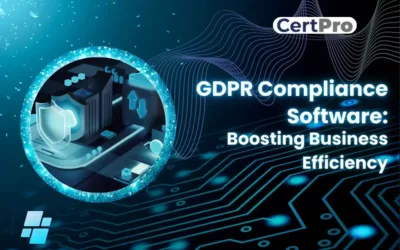GDPR
GENERAL DATA PROTECTION REGULATION
The European Union (EU) has implemented the General Data Protection Regulation (GDPR), a comprehensive data protection framework, to safeguard people’s privacy and personal data. It came into effect on May 25, 2018, and has a wide-reaching impact on organizations that handle the personal data of EU residents, regardless of their location.
GDPR compliance is not a certification but rather a legal requirement. Organizations that handle personal data must comply with GDPR principles, which include obtaining consent for data processing, providing transparent privacy policies, implementing security measures, and respecting individual rights regarding their data. Failure to comply with the GDPR can lead to substantial fines and penalties.

GDPR Certification and Auditing Services by CertPro
At CertPro, we recognize the importance of data protection and the value of GDPR certification for organizations committed to safeguarding personal data. We provide comprehensive support to organizations striving for GDPR certification. Our team of experienced professionals will assist you throughout the certification process, ensuring that your organization’s data protection practices align with the latest GDPR standards. We will work closely with your team to develop and implement an effective data protection framework tailored to your specific needs and industry requirements.
Why Choose CertPro for GDPR Certification and Auditing?
Achieving GDPR compliance is essential for organizations handling personal data. CertPro’s certification services streamline the process, ensuring that your organization meets the stringent requirements of the GDPR. CertPro is a trusted and experienced provider of GDPR certification and auditing services. With a strong track record and deep knowledge of data protection regulations, we offer compelling reasons to choose us for your GDPR certification needs:
| Factors | CertPro Advantage |
|---|---|
| Time to Certification | 4x faster than traditional approaches |
| Price | Competitive rates with flexible options |
| Process | Streamlined and efficient methodology |
| Expertise | 10+ years of industry experience |
CertPro’s Cost-Effective Approach to GDPR Certification
| No. of employees | Timeline | Cost (approx.) |
| 1 – 25 | 4 weeks | 2500 USD |
| 25-100 | 6 weeks | 3500 USD |
| 100-250 | 6-8 weeks | 5000 USD |
| 250 plus | 8 weeks | Custom plans |
Understanding the GDPR Certification: Purpose, Scope, and Key Principles
GDPR certification is a voluntary process that enables organizations to demonstrate their compliance with the General Data Protection Regulation (GDPR). The European Union has implemented the GDPR, a comprehensive data protection regulation, to protect personal data. By obtaining GDPR certification, organizations can showcase their commitment to data protection, build trust with stakeholders, mitigate legal risks, strengthen data governance practices, and enhance their international reputation. At a time of increasing data privacy concerns, GDPR certification offers businesses a competitive advantage and reassures individuals that their data is handled with care and under legal requirements.
Purpose and Scope of GDPR
The General Data Protection Regulation (GDPR) serves two main objectives: to empower individuals with greater control over their data and to harmonize data protection laws across the European Union (EU). GDPR aims to enhance privacy rights, increase transparency in data processing, and establish accountability for organizations handling personal data. It protects individuals from potential misuse or unauthorized access to their data and promotes responsible data handling practices. GDPR also facilitates the free flow of personal data within the EU while ensuring a high level of data protection, fostering trust between individuals and organizations in the digital age.
Organizations that handle the personal data of individuals residing in the European Union (EU), irrespective of their location, fall under the scope of the General Data Protection Regulation (GDPR). The GDPR applies to both data controllers (entities that determine the purposes and means of processing personal data) and data processors (entities that process personal data on behalf of the data controllers). It covers a wide range of personal data, including but not limited to names, contact information, financial details, health information, and online identifiers. The regulation applies to various sectors, such as businesses, non-profit organizations, government entities, and service providers that process personal data of EU residents.
The Key principle of GDPR
The GDPR is built upon several fundamental principles that guide the handling of personal data. These key principles include:
- Lawfulness, fairness, and transparency: To process personal data, organizations must have a valid legal basis, which can include the individual’s consent, contractual necessity, legal obligation, vital interests, legitimate interests, or public interest. Additionally, organizations must ensure transparency in how personal data is used and processed, and handle it in a fair manner that respects the rights of individuals.
- Purpose limitation: Personal data should not be further processed in a manner that contradicts the specified, explicit, and legitimate purposes for which it was initially obtained. It ensures that organizations are transparent about why they collect personal data and prevents them from using it for unrelated or undisclosed purposes.
- Data minimization: Only the necessary personal data required for the specified purposes should be collected and processed. Organizations should avoid excessive or irrelevant data collection.
- Accuracy: Personal data must be accurate, up-to-date, and kept in a form that allows identification for no longer than necessary. Organizations should take steps to update or erase inaccurate data.
- Storage limitation: Personal data should be stored only for as long as necessary to fulfill the purposes for which it was collected. Organizations should establish appropriate retention periods and delete or anonymize data when it is no longer needed.
- Integrity and Confidentiality: Organizations must implement appropriate security measures to protect personal data against unauthorized or unlawful processing, accidental loss, destruction, or damage.
- Accountability: Organizations are responsible for complying with GDPR and must demonstrate compliance. And this includes implementing appropriate measures, maintaining records of processing activities, conducting data protection impact assessments, and appointing a Data Protection Officer (DPO) where required.
These principles provide a framework for organizations to ensure that personal data is processed in a fair, transparent, and secure manner, respecting the rights of individuals.
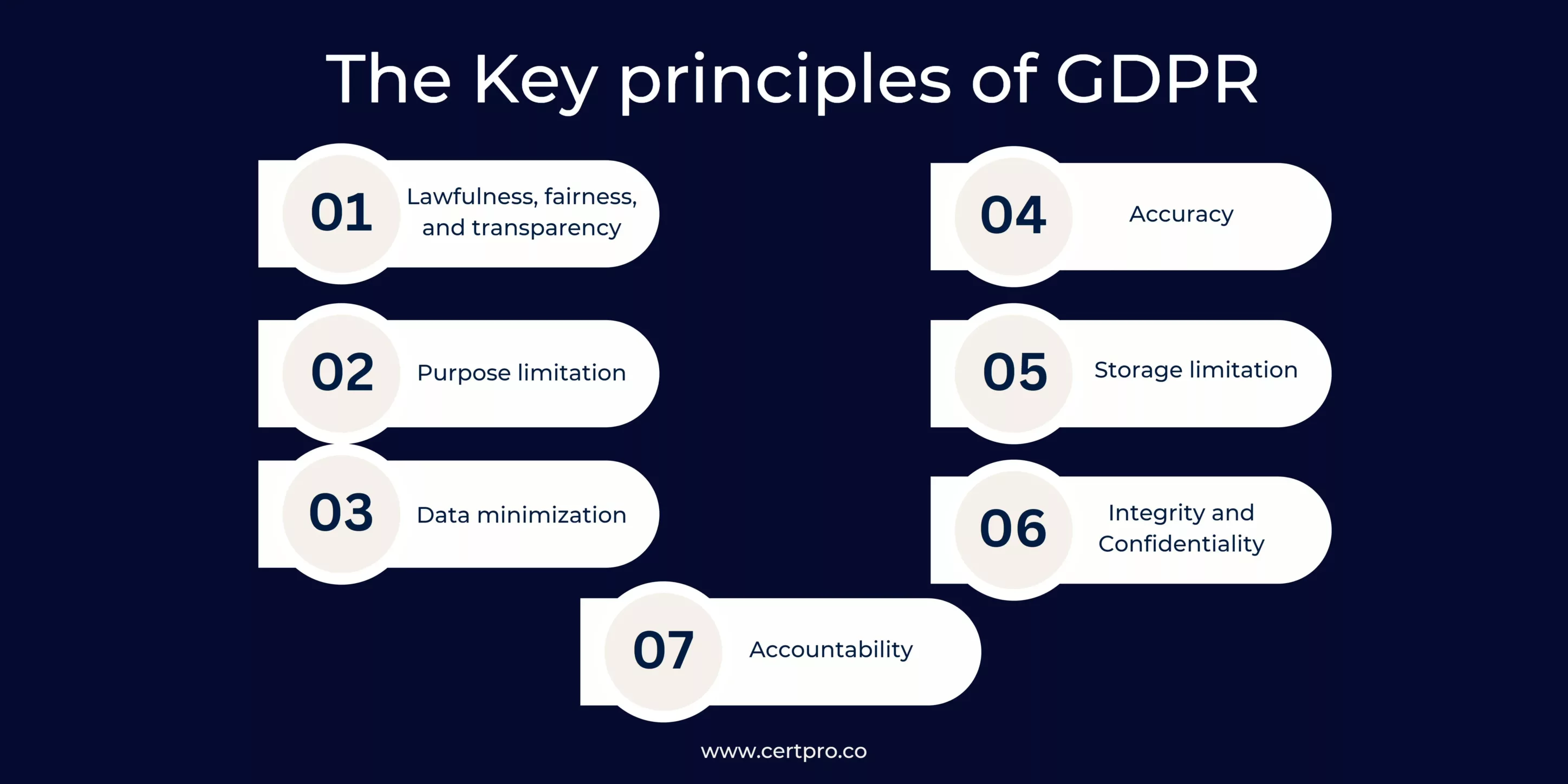
A Step-by-Step Guide to Achieving GDPR Certification
Organizations have the opportunity to showcase their compliance with GDPR principles and strengthen data protection practices by following specific steps:
- Conduct a GDPR Assessment: Begin by conducting a thorough assessment of your organization’s data processing activities, privacy practices, and existing controls. Identify any gaps or areas that require improvement to align with GDPR requirements.
- Develop a GDPR Compliance Plan: Based on the assessment findings, create a detailed plan outlining specific actions and measures needed to achieve compliance. Include timelines, responsibilities, and allocated resources to ensure effective implementation.
- Implement Technical and Organizational Measures: Put in place appropriate technical and organizational measures to ensure the security and protection of personal data. This includes measures like encryption, access controls, data anonymization, and regular vulnerability assessments.
- Establish Policies and Procedures: Develop and implement clear policies and procedures that align with GDPR requirements. Cover areas such as data subject rights, data breach response, data retention, consent management, and vendor management.
- Conduct Employee Training: Provide training to employees who handle personal data. Educate them about GDPR principles, data protection best practices, and their responsibilities regarding data privacy. To keep employees updated, training should be offered frequently.
- Regular Audits and Assessments: Conduct regular internal audits to assess your data protection practices and identify any non-compliance areas. Consider engaging external auditors or certification bodies for independent assessments of your GDPR compliance.
- Maintain Documentation: Keep comprehensive records of your GDPR compliance efforts, including data processing activities, policies, procedures, training records, and audit findings. Documentation demonstrates your commitment to compliance and serves as evidence of your efforts.
- Continuously Monitor and Improve: GDPR compliance is an ongoing process. Stay updated on changes in data protection regulations, review and update the process accordingly, and strive for continuous improvement in your data protection practices.
Following these steps will help organizations demonstrate their commitment to GDPR compliance, enhance their data protection practices, and instill trust in customers and stakeholders regarding the handling of personal data.
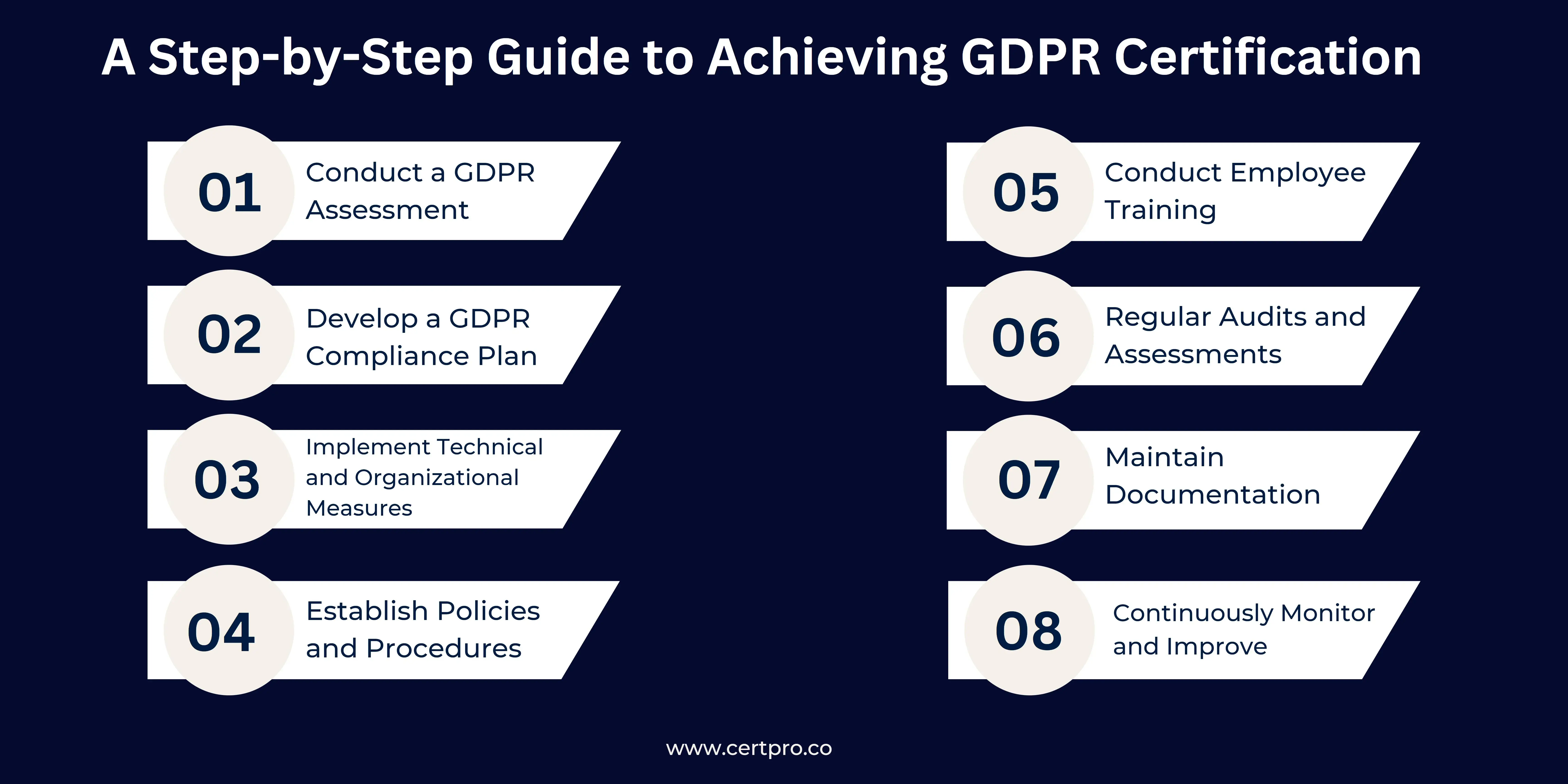
Importance of GDPR compliance
GDPR compliance holds significant importance due to the following reasons:
- Data Protection Standard: GDPR sets a high benchmark for data protection and privacy rights.
- Competitive Advantage: Compliance provides a competitive edge and attracts privacy-conscious customers.
- Customer Trust and Reputation: GDPR compliance enhances customer trust and builds a positive reputation.
- Legal Compliance and Penalties: Non-compliance can result in significant financial Penalties and Legal consequences.
- International Data Transfers: Compliance facilitates smooth international data transfers by meeting global privacy expectations.
- Data Security and Risk Mitigation: GDPR compliance promotes robust data security measures and reduces the risk of data breaches.
- Global Reach: GDPR applies to organizations worldwide that handle the personal data of individuals residing in the European Union (EU).
-
Harmonization of Data Protection Laws: GDPR harmonizes data protection laws within the EU, simplifying compliance efforts for organizations operating across member states
GDPR compliance is crucial for legal adherence, protecting individuals’ rights, fostering trust, minimizing risks, and maintaining a competitive advantage. It promotes responsible data management, safeguards privacy, and upholds the fundamental principles of data protection in a digital age.
The Requirements for GDPR Certification
The requirements for GDPR certification can vary depending on the specific certification body and the certification scheme chosen. However, there are some common elements and criteria that organizations typically need to fulfill to achieve GDPR certification. These requirements may include:
- GDPR Compliance: Organizations must demonstrate compliance with the General Data Protection Regulation (GDPR) and its key principles, such as lawful and transparent data processing, purpose limitation, data minimization, accuracy, storage limitation, integrity, confidentiality, and accountability.
- Documentation and Policies: Organizations should have proper documentation in place, including data protection policies, procedures, and records of processing activities. This document should outline how personal data is handled, stored, and protected within the organization.
- Data Protection Officer (DPO): Depending on the size and nature of the organization, appointing a Data Protection Officer may be a requirement. The DPO is responsible for overseeing data protection activities and ensuring compliance with GDPR.
- Data Protection Impact Assessments (DPIAs): Organizations may need to conduct DPIAs for high-risk data processing activities. These assessments help identify and mitigate potential privacy risks associated with specific processing operations.
- Security Measures: Adequate technical and organizational measures must be implemented to protect personal data against unauthorized access, accidental loss, or destruction. Implementing appropriate access controls, encryption, data security controls, and regular security audits are all part of this.
- Data Subject Rights: Organizations must establish processes to address individuals’ rights, such as the right to access their data, rectification, erasure (the “right to be forgotten”), data portability, and the right to object to processing.
- Data Breach Notification: Organizations need to have procedures in place to detect, assess, and report personal data breaches to the relevant supervisory authority and, in certain cases, to affected individuals.
- Training and Awareness: Employees should receive training on data protection and privacy matters to ensure they understand their responsibilities and are aware of best practices.
Organizations need to consult with a certification body or an authorized GDPR certification provider to get detailed information on specific requirements and the certification process. Also, this will help organizations ensure they meet the necessary criteria and successfully achieve GDPR certification.
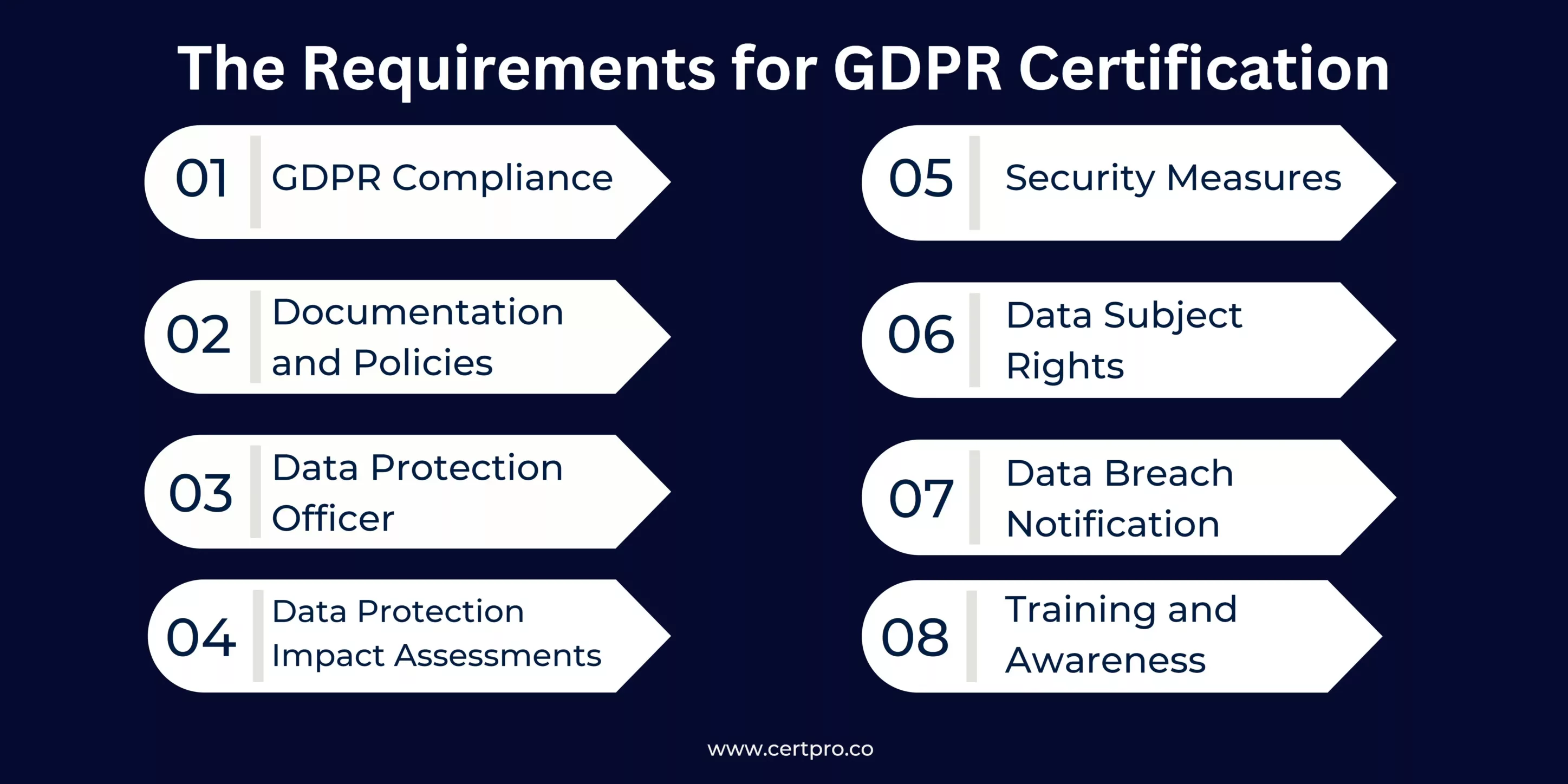
Benefits of GDPR Certification
Obtaining GDPR certification offers several benefits for organizations, contributing to increased trust, credibility, and competitive advantage in the following ways:
- Increased Trust and Credibility: GDPR certification demonstrates an organization’s commitment to protecting individuals’ data, which enhances trust among customers, clients, and stakeholders. It signals that the organization has implemented robust data protection measures and is dedicated to complying with GDPR principles.
- Competitive Advantage: Certification sets an organization apart from competitors by showcasing its commitment to data protection and privacy. It can be a differentiating factor for customers who prioritize working with GDPR-compliant companies, giving certified organizations a competitive edge in the market.
- Reduced Risk of Fines and Penalties: GDPR compliance and certification significantly reduce the risk of non-compliance fines and penalties. By adhering to GDPR requirements, organizations mitigate the possibility of regulatory sanctions, reputational damage, and financial losses associated with data breaches or non-compliant practices.
- Improved Data Protection Practices: The certification process necessitates organizations to assess and enhance their data protection practices. It promotes the implementation of robust security measures, policies, and procedures, leading to improved data governance, risk management, and incident response capabilities.
- Enhanced Reputation: GDPR certification can bolster an organization’s reputation as a responsible and trustworthy data controller or processor. It demonstrates a proactive approach to protecting personal data, which can positively influence customer perception, partnerships, and overall brand image.
While GDPR certification provides organizations with tangible benefits, enabling them to gain a competitive advantage, build trust, reduce risks, and enhance their overall data protection practices and reputation.
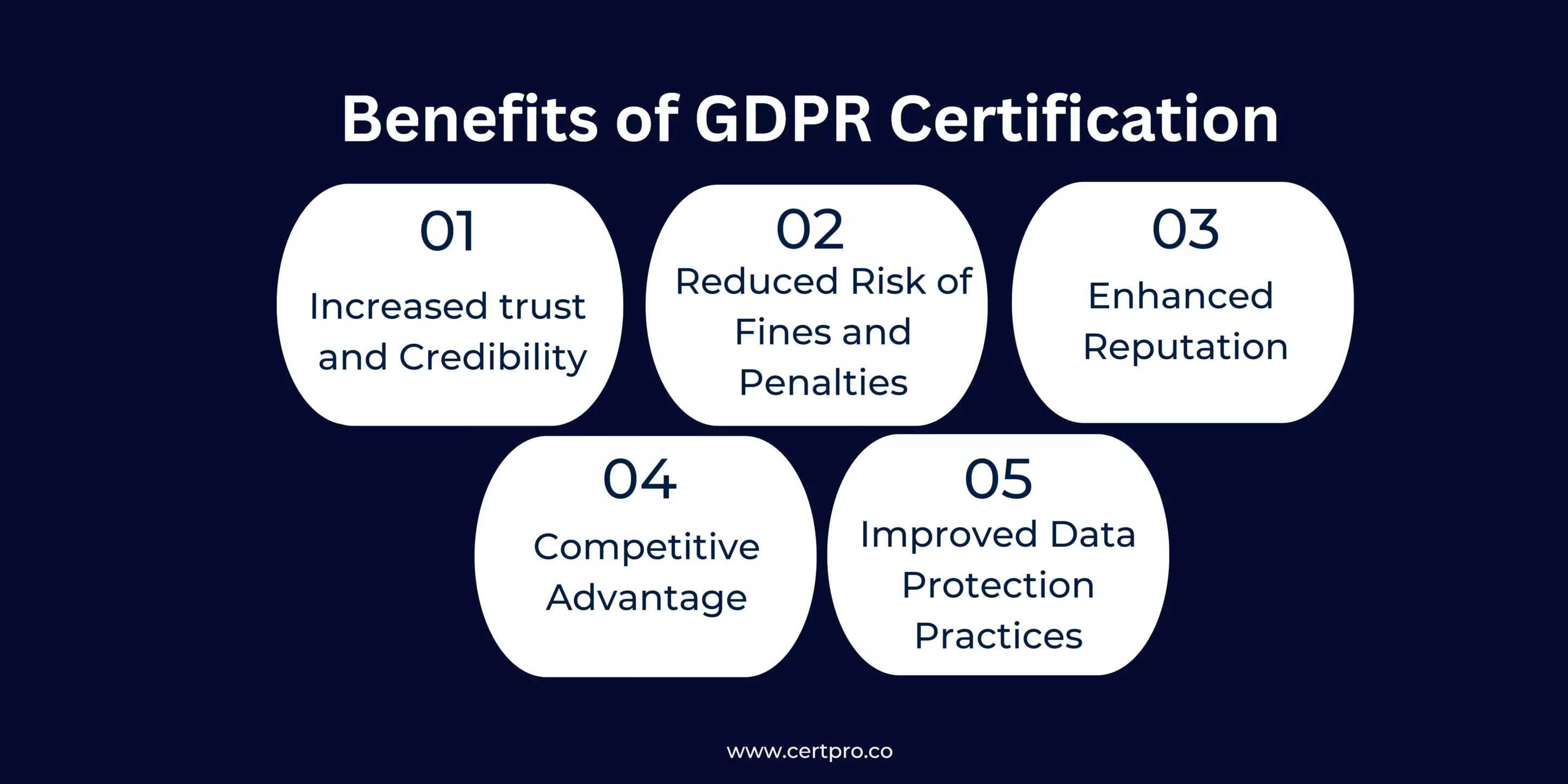
Eligibility for GDPR Certification
GDPR certification is available to any organization, regardless of its size or location, that processes the personal data of individuals residing in the European Union (EU). This includes businesses, non-profit organizations, government entities, and service providers. Whether an organization acts as a data controller or a data processor, it has the opportunity to pursue GDPR certification to demonstrate its commitment to data protection and compliance with the GDPR’s requirements. By obtaining GDPR certification, organizations can showcase their dedication to privacy, build trust with stakeholders, and differentiate themselves in the marketplace as responsible custodians of personal data.
GDPR Compliance: Who Should Ensure Compliance?
GDPR compliance is essential for organizations that handle the personal data of individuals residing in the European Union (EU). Any organization, regardless of its size or location, that processes the personal data of EU residents should strive to be GDPR-compliant. And this includes both data controllers and data processors, covering a wide range of entities such as businesses, non-profit organizations, government agencies, and service providers. Organizations across various industries must adhere to the GDPR’s stringent data protection requirements to ensure the privacy and rights of individuals. Compliance not only mitigates legal risks but also builds trust among customers, partners, and stakeholders.
Understanding the GDPR Fines
Under the General Data Protection Regulation (GDPR), fines can be imposed on organizations for non-compliance with data protection requirements. The fines are categorized into two tiers, depending on the severity of the violation:
Tier 1: This tier applies to less severe infringements. The maximum fine can reach up to €10 million or 2% of the organization’s global annual turnover, whichever is higher. It includes violations such as failure to implement appropriate security measures, failure to conduct impact assessments, or failure to maintain records.
Tier 2: This tier applies to more serious violations. The maximum fine can go up to €20 million or 4% of the organization’s global annual turnover, whichever is higher. It includes violations such as inadequate consent mechanisms, unlawful data processing, non-compliance with data subject rights, or failure to report data breaches.
The actual amount of the fine depends on various factors, including the nature, gravity, and duration of the infringement, the number of affected individuals, the level of cooperation with authorities, and any previous infringements. The fines aim to be proportionate, dissuasive, and effective in ensuring organizations prioritize data protection and privacy. National data protection authorities have the power to impose fines based on their assessment of the violation.
The Costs of GDPR Certification
The cost of GDPR certification varies depending on several factors, such as the size and complexity of the organization, the certification body chosen, and the level of readiness for compliance. Generally, the cost includes expenses associated with conducting a GDPR assessment, developing and implementing compliance measures, employee training, engaging with a certification body, and undergoing the certification audit. Additionally, ongoing maintenance and monitoring costs should be considered. While specific figures can vary significantly, organizations should budget for expenses related to internal resources, external consultants or advisors, technology upgrades, and potential adjustments to policies and procedures. It is advisable to obtain quotes from different certification bodies and carefully evaluate the costs involved before proceeding with GDPR certification.
A Complete Guide to GDPR Compliance
GDPR compliance refers to adhering to the requirements set forth by the General Data Protection Regulation (GDPR) to ensure the protection of individuals’ data. Best practices for achieving GDPR compliance include conducting a data inventory to understand the types of data collected and processed, implementing privacy by design and default to embed data protection measures from the outset, developing data protection policies and procedures to govern data handling practices, training employees on GDPR principles and their roles, and conducting regular audits to assess compliance and identify areas for improvement. These practices help organizations establish a strong foundation for data protection and meet their obligations under the GDPR.
The Validity Period of GDPR Certification
GDPR certification does not have a specific validity period. Once an organization achieves GDPR certification, it signifies that they have met the requirements and demonstrated compliance at the time of the certification. However, it is important to note that GDPR compliance is an ongoing process, and organizations are expected to maintain compliance continuously. This involves regularly reviewing and updating policies and procedures, conducting audits, and adapting to any changes in the regulatory landscape to ensure the ongoing protection of personal data and adherence to GDPR principles.
Understanding the Impact of GDPR on India: Assessing the Pros and Cons
The implementation of the General Data Protection Regulation (GDPR) has had significant implications for India. On the positive side, GDPR has raised awareness about the importance of data protection and privacy rights, prompting Indian organizations to enhance their data handling practices. It has also facilitated stronger data protection standards, which can benefit Indian citizens and foster trust in the digital ecosystem. However, GDPR compliance can pose challenges for Indian businesses, particularly small and medium enterprises (SMEs), due to the associated costs and complexities. Additionally, GDPR’s extraterritorial reach can impact Indian organizations that handle EU citizens’ data. Balancing the pros and cons of GDPR, India must evaluate the potential advantages of enhanced data protection and privacy against the challenges faced by businesses, ensuring harmonious alignment with its data protection framework and regulatory requirements.
CertPro: Your Trusted Partner in Achieving GDPR Certification
CertPro is a global company that provides auditing and consulting services to help businesses achieve GDPR certification. Their experienced auditors and consultants utilize industry best practices to deliver turnkey projects that meet their clients’ compliance needs within the required timelines and budgets. They stay up-to-date with the latest technological developments in the compliance field and are equipped to audit compliance automation tools. CertPro offers innovative methods to expedite projects and add maximum value to their clients organizations. They guide clients throughout their compliance journey, serving as a one-stop solution partner for all compliance auditing, consulting, and certification needs. With their expertise and customer-centric approach, CertPro can assist businesses in becoming GDPR-certified with ease and confidence.
FAQ’s
What are the rights of individuals under GDPR?
Under GDPR, individuals have the following rights: the right to access their data; the right to rectify inaccurate data; the right to erasure (“right to be forgotten”); the right to restrict processing; the right to data portability; the right to object to processing; and rights related to automated decision-making and profiling.
Do small businesses need to comply with GDPR?
Yes, small businesses need to comply with GDPR if they process the personal data of individuals in the European Union (EU) or offer goods or services to EU residents. The GDPR applies to organizations of all sizes that handle EU citizens’ data, irrespective of their geographical location.
How long does it take to comply with the GDPR?
The time it takes to become GDPR-compliant varies depending on the size and complexity of the organization, existing data protection practices, and resources allocated to compliance efforts. It can range from several months to over a year, considering the implementation of necessary policies, procedures, and technical measures.
How can I determine if my organization is GDPR-compliant?
To determine if your organization is GDPR-compliant, you should conduct a comprehensive assessment of your data processing activities, policies, and procedures. That involves reviewing data protection practices, assessing data flows, documenting data processing activities, ensuring a legal basis for processing, and conducting regular internal audits to identify compliance gaps.
Can organizations transfer personal data to countries outside the EU under GDPR?
Yes, organizations can transfer personal data to countries outside the European Union (EU) under GDPR, but they must ensure an adequate level of protection for the data. This can be achieved through various mechanisms, such as obtaining explicit consent, implementing Standard Contractual Clauses (SCCs), relying on Binding Corporate Rules (BCRs), or relying on approved certification mechanisms or codes of conduct.
HOW TO CONDUCT A GDPR AUDIT FOR MY BUSINESS?
The General Data Protection Regulation (GDPR) is vital for today's digital landscape. It is a cornerstone for safeguarding people's privacy rights in the European Union (EU). Therefore, organizations dealing with EU residents' data must follow these GDPR rules....
GDPR DATA BREACH NOTIFICATION: THE ULTIMATE GUIDELINE FOR SECURING DATA
Modern businesses require incorporating personal data protection strategies to ensure customer satisfaction and business growth. In this respect, the European Union's General Data Protection Regulation (GDPR) sets strict standards for maintaining data security....
GDPR Compliance Software: Boosting Business Efficiency
Handling large amounts of personal data has become a significant concern in today's digital landscape, necessitating a thorough understanding of the intricate legal framework, particularly within the European Union. An essential piece of legislation in this regard is...


